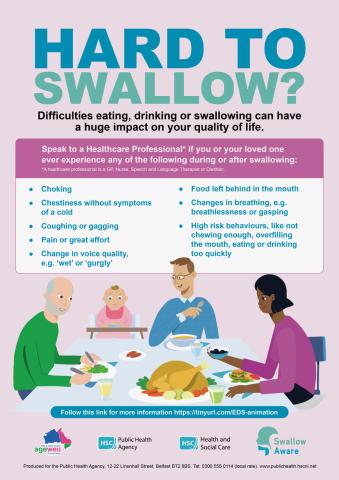Raising awareness of dysphagia on Swallow Awareness Day

This Swallow Awareness Day [Wednesday 16 March] the Public Health Agency (PHA) is raising awareness of swallowing difficulties by launching a new digital poster which will be promoted regionally through community and voluntary sector organisations.
The digital poster, which has been developed in partnership with Mid and East Antrim Agewell Partnership (MEAAP), is designed to highlight the signs and symptoms of swallowing difficulties in the hope of detecting the condition early and signposting to services that can help.
Dysphagia is the medical term for swallowing difficulties, which can affect anyone at any stage of their life. Some people with dysphagia have problems swallowing certain foods or liquids, while others can't swallow at all.
The new digital poster also directs people to the PHA’s animation available at www.pha.site/Dysphagia which was first launched on Swallow Awareness Day last year to raise awareness of the signs of eating, drinking and swallowing difficulties.
Michelle Tennyson, Assistant Director of Allied Health Professions and Public Involvement at the PHA and Chair of Dysphagia NI said: “Eating, drinking and swallowing difficulties can occur at any stage of life and can often occur alongside other conditions, such as premature birth, learning disability, dementia or stroke.
“Many social occasions revolve around food and drink, such as going out for a coffee with a friend, or family meals. People with dysphagia face the difficulty of having to think about how they’ll be able to eat or drink at these events, and sometimes they avoid them entirely.
“The good news is that support is available to help those with dysphagia manage the condition and live well with a swallowing difficulty. If you notice any changes to your swallow and are encountering any difficulties, contact a healthcare professional as soon as possible, such as your GP or a Speech and Language Therapy service, and ask for help.”
Sharon Hughes-Magill, who lives with a swallowing difficulty, said: “There are ways that you can still enjoy your food and your flavours and there are ways to stay in control and involved in your process. I think the important thing is that anybody who is facing a swallowing difficulty, whether temporary or permanent, it doesn’t have to define them as a person.”
Dysphagia can lead to weight loss, chest infections, pneumonia and even death, and can impact on social isolation and mental health, so it is important you seek help.
Signs of difficulty when eating, drinking and swallowing include:
- Coughing or choking during or after meals or drinks;
- Change in voice quality e.g. “gurgly” or wet voice;
- Change in breathing e.g. wheezy or shortness of breath;
- Change of colour in the face;
- Pain or great effort to swallow;
- Food left behind in the mouth after swallowing;
- High risk behaviours, like not chewing enough, overfilling the mouth, eating or drinking too quickly;
- Recurrent or regular chest infections – not accompanied by signs of the cold.
Michelle concluded: “If you notice any of these symptoms or care for someone who has them, it is important not to ignore it. Sometimes these difficulties can be a symptom of other illnesses, so it’s important to get it checked out.”
To view the Swallow Awareness animation, digital poster and for further information visit www.pha.site/Dysphagia
The Royal College of Speech and Language Therapists say it is estimated that eating, drinking and swallowing difficulties can affect:
- 27-40% of babies born early;
- 25-45% of a typical developing children’s’ population;
- 40-78% of stroke survivors;
- 8% of adults with a learning disability;
- 50%-75% of people living in a nursing home.
If you think you or someone you care for may have a swallowing difficulty, please contact a healthcare professional such as a GP or Speech and Language Therapist.
For more information visit www.pha.site/Dysphagia
Royal College of Speech and Language Therapists: http://www.rcslt.org
If you have experienced swallowing difficulties or are a carer with experience in helping those with swallowing difficulties, the PHA would like to hear from you.
Dysphagia NI is a regional stakeholder group.
Please visit www.pha.site/Dysphagia to find out more and contact our team.
